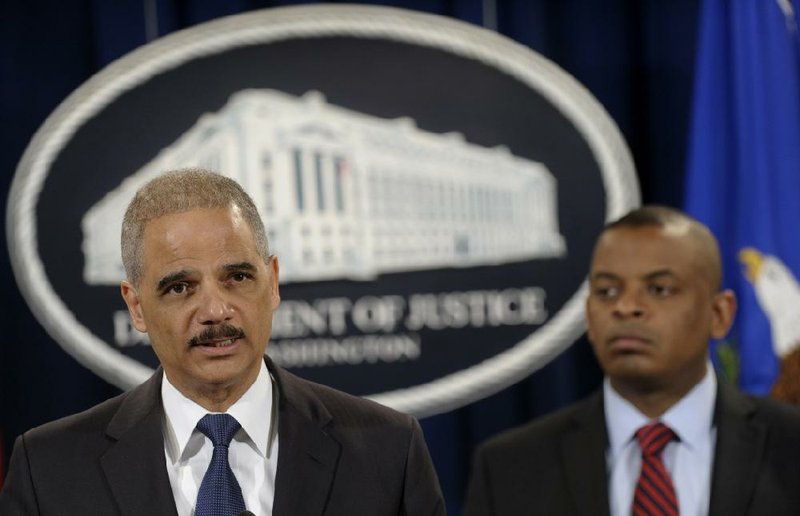WASHINGTON - The U.S. government announced a $1.2 billion settlement Wednesday with Toyota Motor Corp. and filed a criminal charge alleging the company defrauded consumers by issuing misleading statements about safety problems in Toyota and Lexus vehicles. The penalty is the largest of its kind ever imposed on an auto company, the Justice Department said.
The action concludes a years-long criminal investigation into the Japanese automaker’s disclosure of safety problems, which focused on whether Toyota was forthright in reporting incidents of unintended acceleration.
The company admitted to misleading consumers and regulators by providing assurances that it had addressed the problems - which became public in 2009 after a car crash in San Diego killed a family of four - through a limited safety recall of certain models. Toyota knew at the time that other models susceptible to the same acceleration problem had not been recalled and also took steps to conceal a separate acceleration problem related to a faulty pedal, according to the Justice Department.
“In other words, Toyota confronted a public-safety emergency as if it were a simple public-relations problem,” Attorney General Eric Holder said at a news conference.
The company faces a criminal wire-fraud charge in New York that prosecutors say they will move to dismiss in three years if Toyota complies with the terms of the deal. Under a deferred prosecution agreement, an independent monitor will review policies, practices and procedures at the company.
In a statement Wednesday, Toyota said that at the time of the recalls, “we took full responsibility for any concerns our actions may have caused customers, and we rededicated ourselves to earning their trust,” said Christopher Reynolds, chief legal officer of Toyota Motor North America.
“In the more than four years since these recalls, we have gone back to basics at Toyota to put our customers first,” he said.
Toyota said it had “made fundamental changes to become a more responsive and customer-focused organization, and we are committed to continued improvements.”
No Toyota executives were charged under the deal. U.S. Attorney Preet Bharara of the Southern District of New York, whose office filed the case, said he expected the agreement to be a “final resolution.”
“The entire auto industry should take notice,” Bharara said.
At one point during the news conference, which was also attended by U.S. Transportation Secretary Anthony Foxx, Bharara slipped up and said “General Motors” instead of “Toyota,” prompting awkward smiles from government officials including Holder, who had just taken pains to avoid saying anything about whether General Motors was even under investigation.
GM Chief Executive Officer Mary Barra apologized Tuesday for the recall of 1.6 million compact cars for a problem discovered when owners began complaining that the autos would switch off if driven with a heavy key chain or bumped.
Holder, while refusing to confirm or deny any federal investigation into GM, said the Toyota case will be a model for the government’s approach to such issues.
“Other car companies should not repeat Toyota’s mistake: A recall may damage a company’s reputation, but deceiving your customers makes that damage far more lasting,” he said.
Starting in 2009, Toyota issued recalls, mostly in the U.S., totaling more than 10 million vehicles for various problems including faulty brakes, gas pedals and floor mats. From 2010 through 2012, Toyota Motor Corp. paid fines totaling more than $66 million for delays in reporting problems with unintended acceleration.
The settlement continues a string of bad publicity for Toyota, which before the acceleration cases had an image of reliability. Since the cases surfaced, the company’s brand image has been damaged and it has lost U.S. market share as competition has intensified.
Last year, Toyota agreed to pay more than $1 billion to resolve hundreds of lawsuits claiming that owners of its cars suffered economic losses because of the recalls. But that settlement did not include wrongful-death and injury lawsuits that have been consolidated in California state and federal courts.
In December, Toyota filed court papers after a four-year legal battle, saying that it’s in settlement talks on nearly 400 U.S. lawsuits, but other cases aren’t included in the talks.
The negotiations came less than two months after an Oklahoma jury awarded $3 million in damages to the injured driver of a 2005 Camry and to the family of a passenger who was killed.
The ruling was significant because Toyota had won all previous unintended-acceleration cases that went to trial. It was also the first case where attorneys for plaintiffs argued that the car’s electronics - in this case the software connected to a midsize Camry’s electronic throttle-control system - were the cause of the unintended acceleration.
At the time, legal experts said the Oklahoma verdict might cause Toyota to consider a broad settlement of the remaining cases. Until then, Toyota had been riding momentum from several trials where juries found it was not liable.
Toyota has blamed drivers, stuck accelerators or floor mats that trapped the gas pedal for the acceleration claims that led to the big recalls of Camrys and other vehicles. The company has repeatedly denied its vehicles are flawed. Information for this article was contributed by Eric Tucker and Tom Krisher of The Associated Press; by David S. Joachim and Matt Apuzzo of The New York Times; and by Del Quentin Wilber of Bloomberg News.
Front Section, Pages 1 on 03/20/2014
